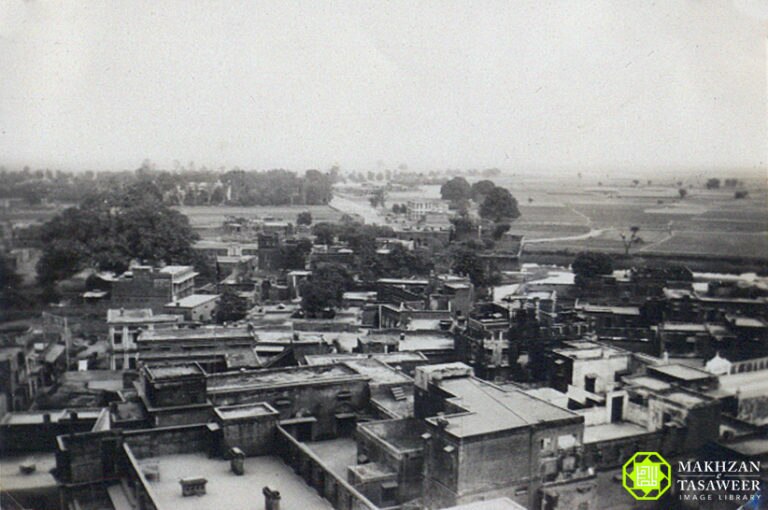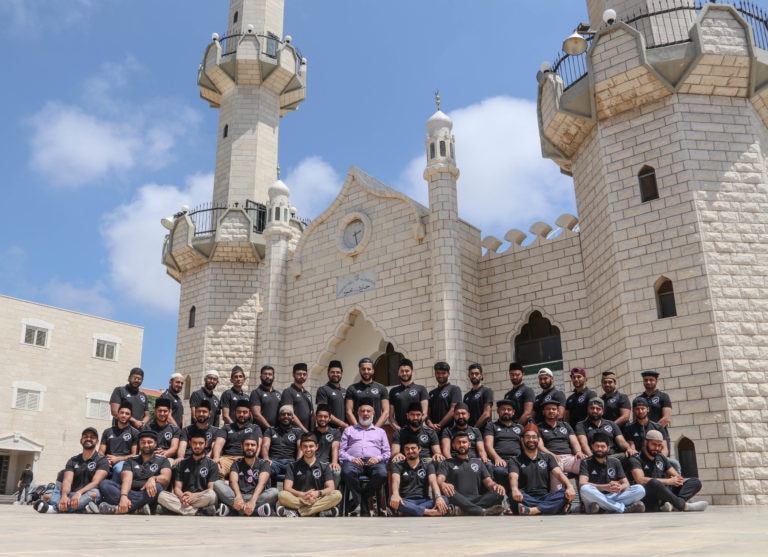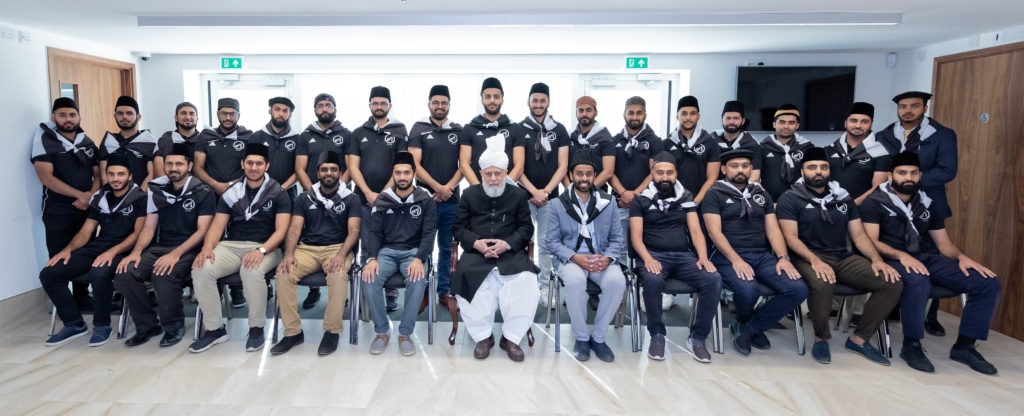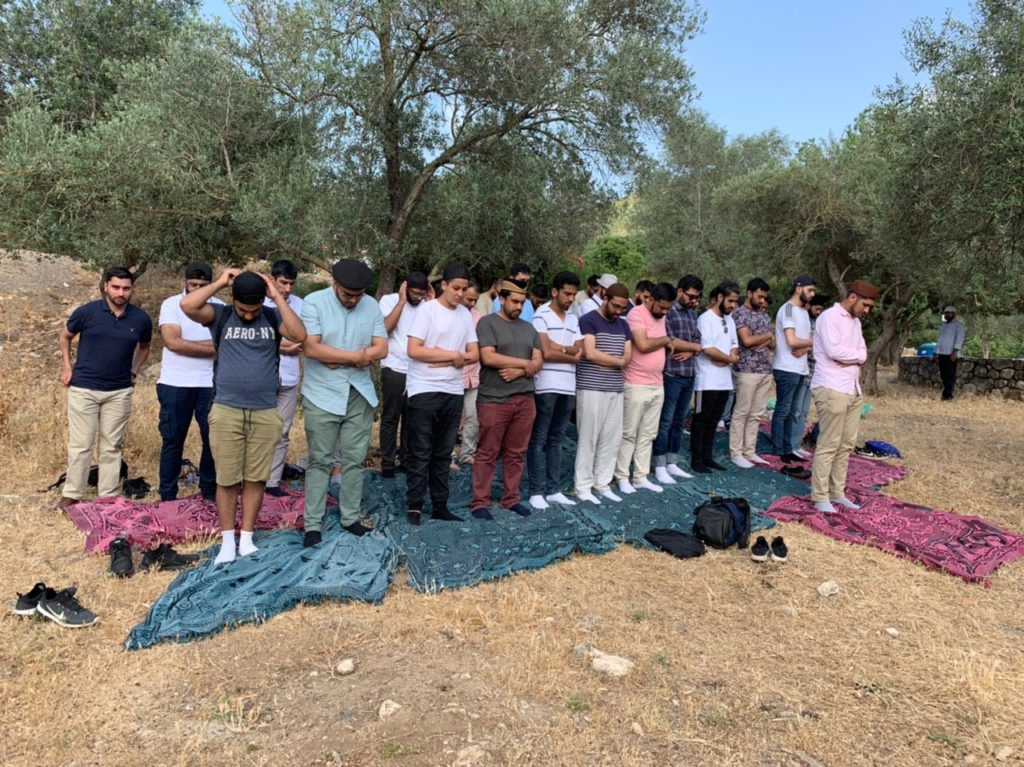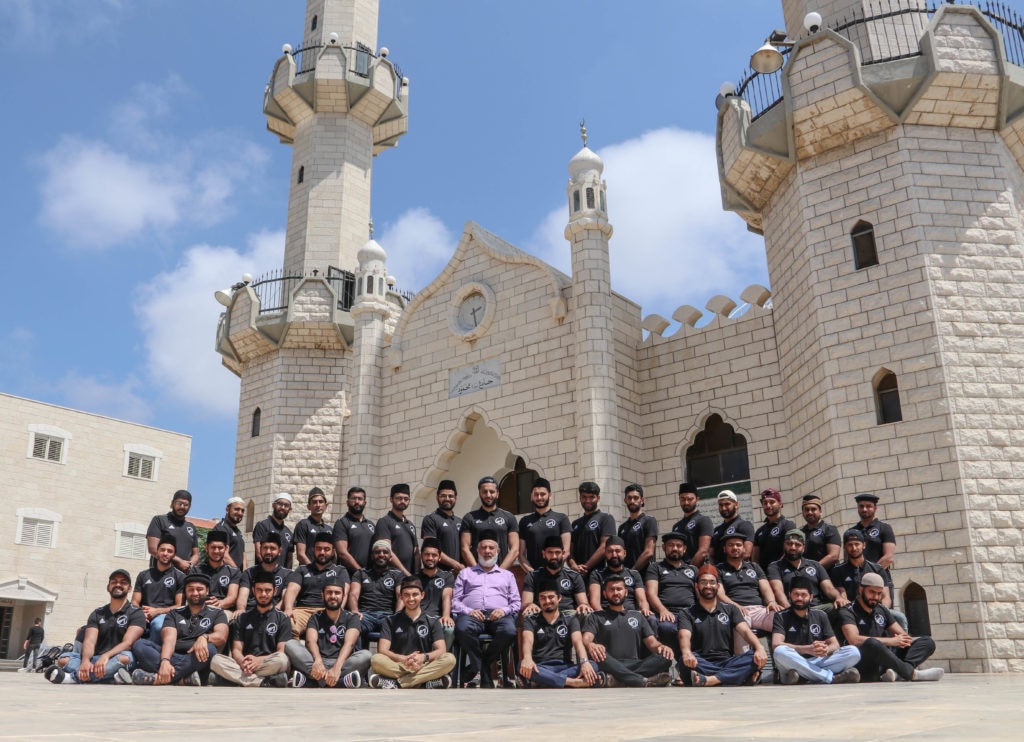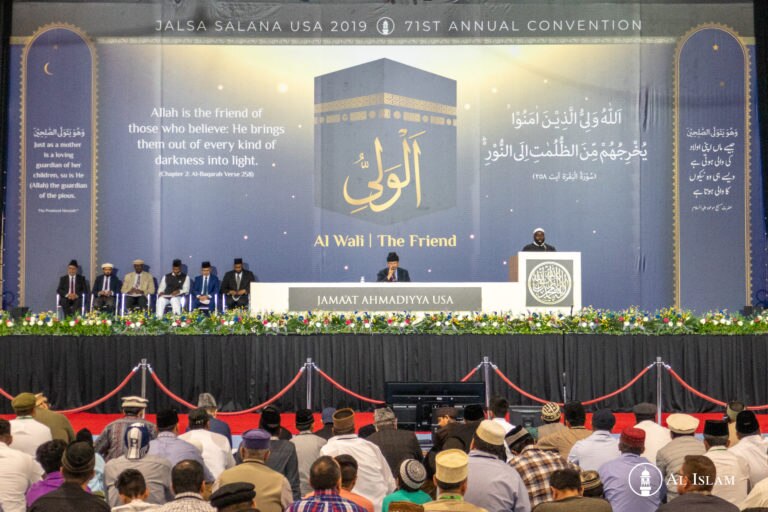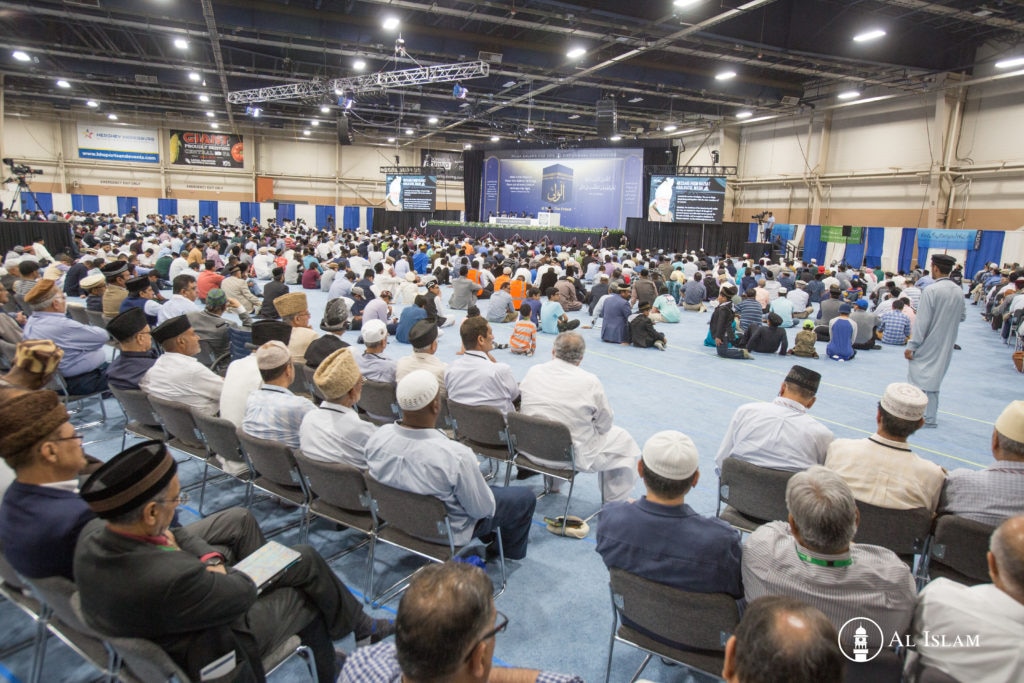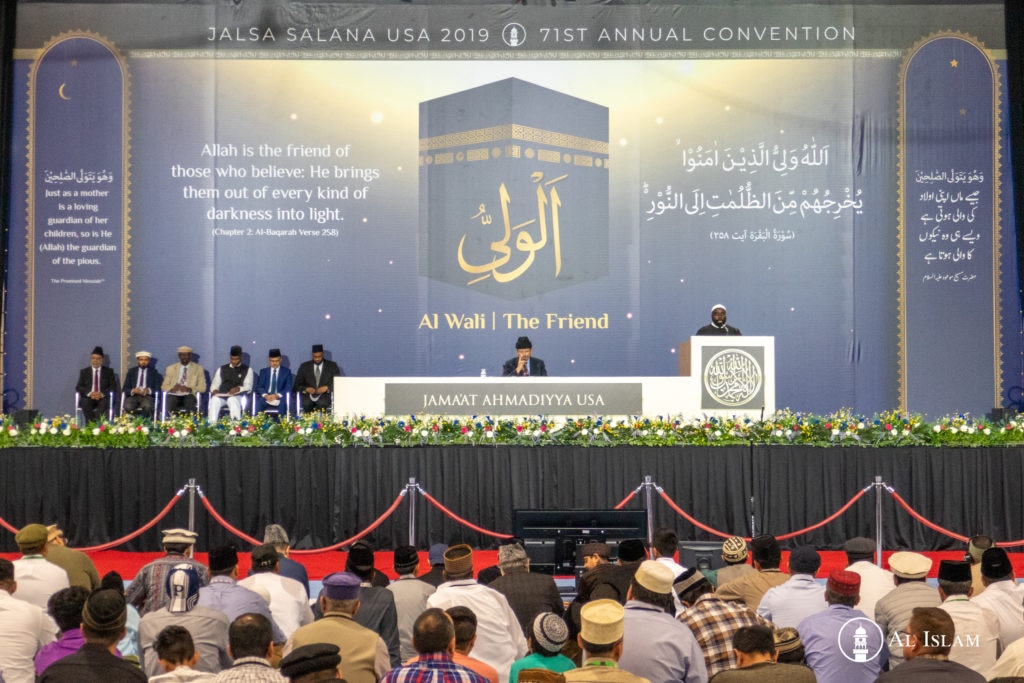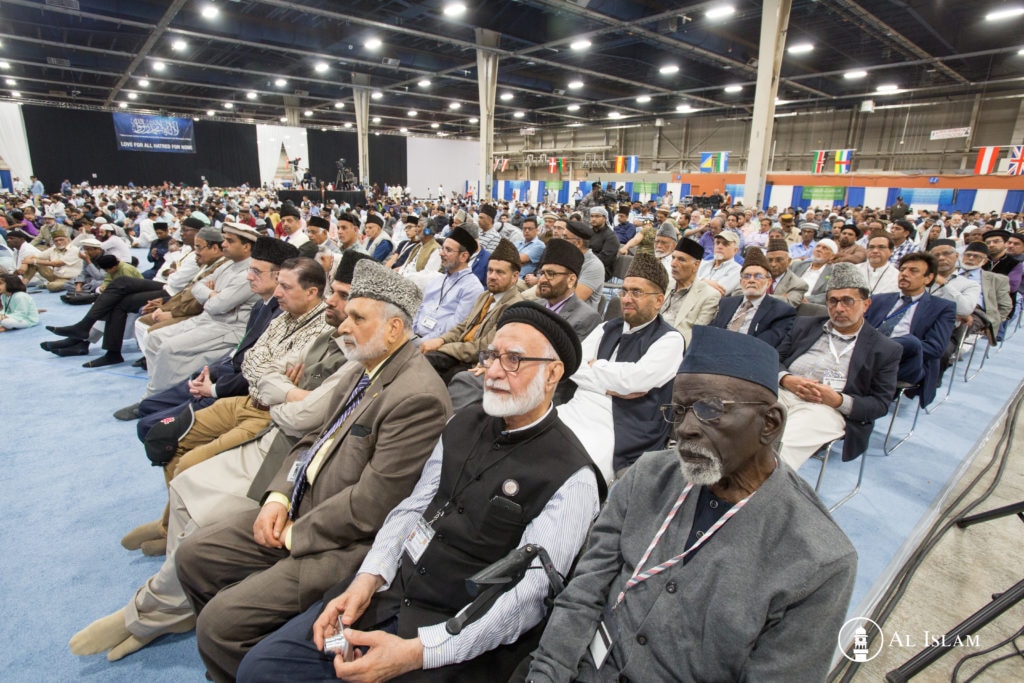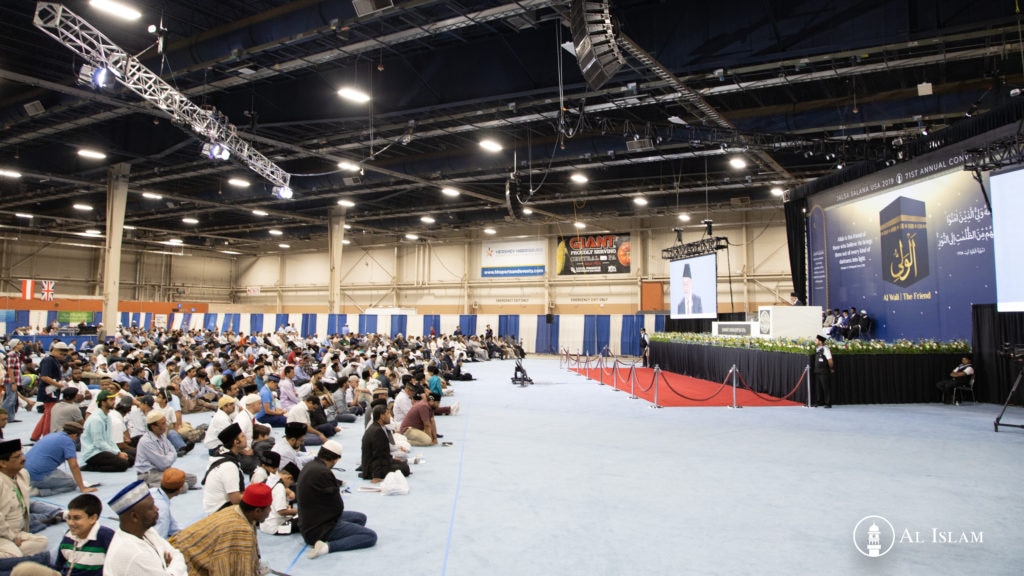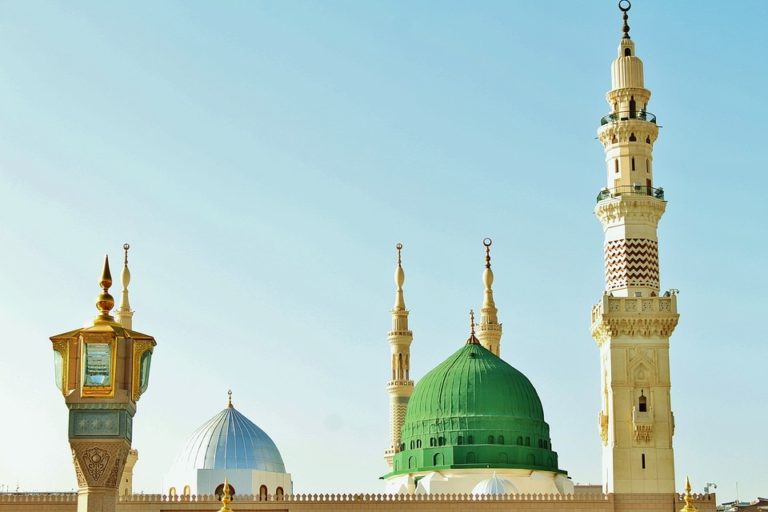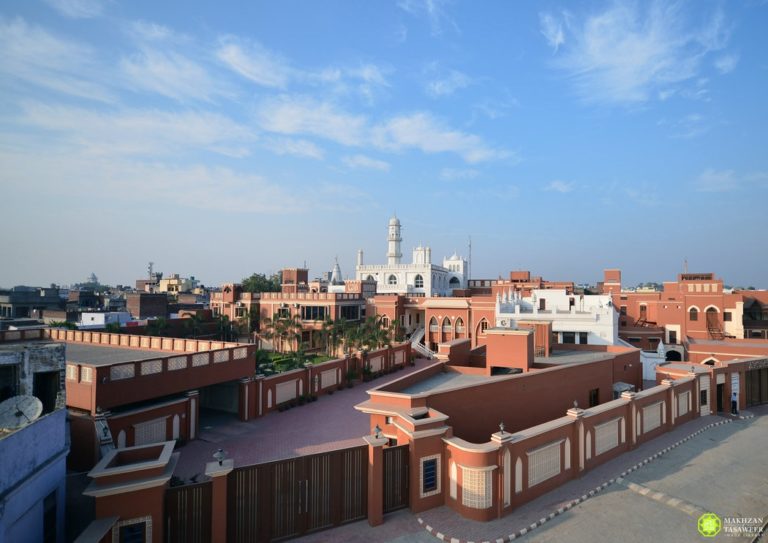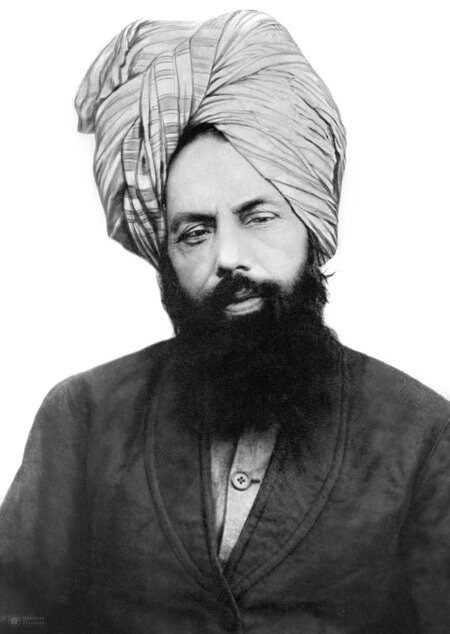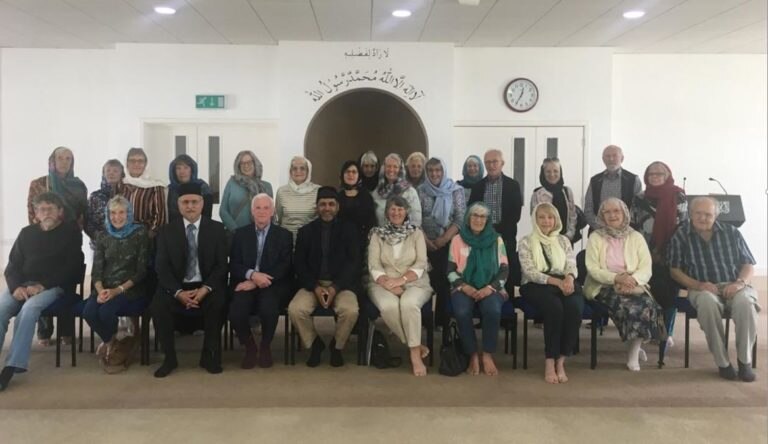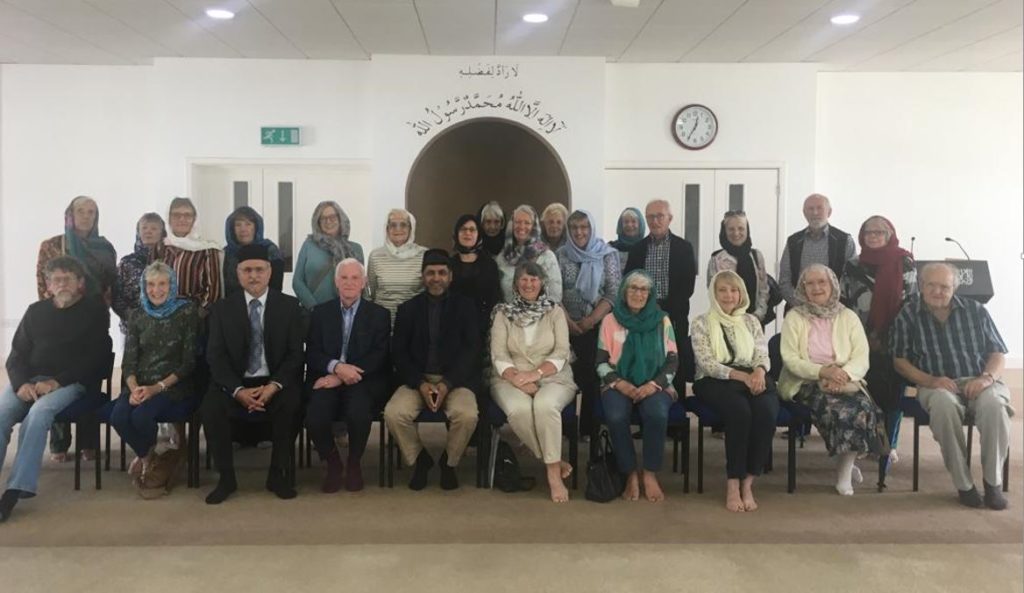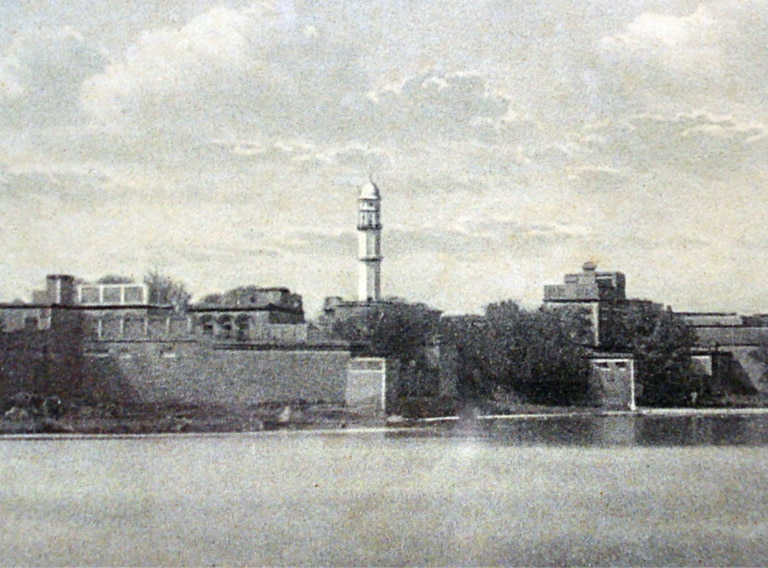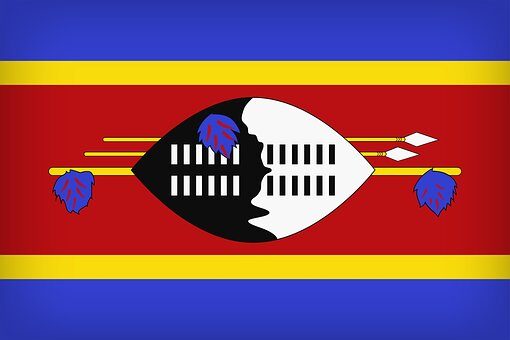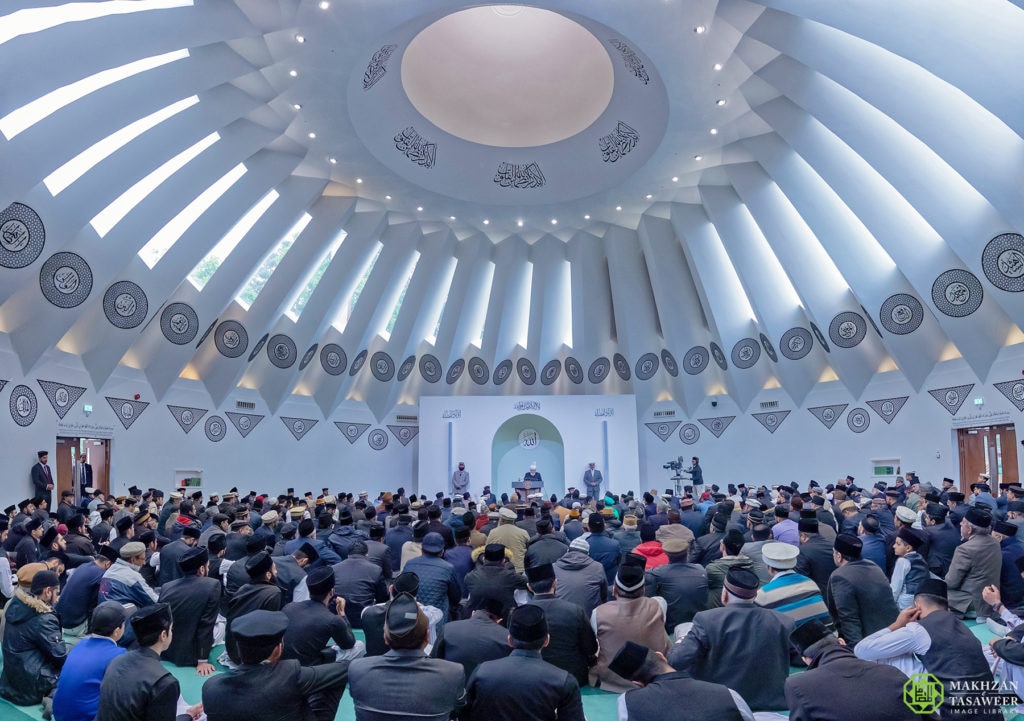Friday Sermon
21 June 2019
Hazrat Zaynab bint Jahshra
After reciting the Tashahud, Ta‘awuz and Surah al-Fatihah, Hazrat Khalifatul Masih Vaa stated:
In the
previous sermon, I narrated some incidents with regard to Hazrat Zaidra
bin Haritha. In this regard, I mentioned that the Holy Prophetsa
later married Hazrat Zainabra bint Jahsh and that I will continue to
relate a few more narrations regarding the marriage.
“At the time of her marriage, Hazrat
Zainabra bint Jahsh was thirty-five years of age and in light of the
circumstances of Arabia at the time, this was considered middle-aged or old.
Hazrat Zainabra was a very righteous, pious and affluent lady.
Despite the fact that from among all the wives of the Holy Prophetsa,
Hazrat Aishara was contested and rivalled by Zainab alone, Hazrat
Aishara still highly praised the inherent virtue and purity of
Hazrat Zainabra, and would often say:
‘I have not seen a more pious lady than
Zainabra. She was very righteous and truthful, she was very kind
towards relatives, she would give a great amount of charity and alms, and
worked tirelessly for goodness and to attain divine nearness. The only thing
was that she was a bit heated in temper, but immediately thereafter, she would
feel remorse herself.’
“The degree to which she would give
charity and alms was such that Hazrat Aishara relates:
‘On one occasion, the Holy Prophetsa
said to us,
اَسْرَعُکُنَّ
لِحَاقًا بِیْ اَطْوَلُکُنَّ یَدًا۔
“The one from among you who has the
longest hands, shall be the first to pass away after my demise and join me.”’
“Hazrat Aishara states, ‘We
inferred this to mean physical hands, and would often measure our hands with
one another. However, when the Holy Prophetsa passed away and Zainabra
bint Jahsh was the first to leave this world, it was then that the secret
revealed itself to us that the word “hand” referred to charity and alms, not a
physical hand.’”
Hazrat Mirza Bashir Ahmad Sahibra
further writes:
“As it was apprehended, upon the marriage
of Hazrat Zainabra the hypocrites of Medina raised many allegations
and openly taunted that ‘Muhammad[sa] had married the divorcee of
his son and had made his own daughter-in-law permissible for himself.’ However,
since the very purpose of this marriage was to erase this ignorant Arabian
custom, these objections were also inevitable.
“At this instance, it is also necessary to
mention that Ibn-e-Saad, Tabari etc. have recorded an absolutely
false narration in relation to the marriage of Hazrat Zainabra.
Since this narration furnishes an opportunity to raise an objection against the
pristine character of the Holy Prophetsa, various Christian
historians have adorned their books with this narration in a most unpleasant
manner. The story goes that when the Holy Prophetsa married Zainabra
bint Jahsh to Zaid, one day the Holy Prophetsa came to the home of
Hazrat Zaidra in search of him. Incidentally, at the time Zaidra,
was not at home. Standing outside at the front door, when the Holy Prophetsa
called for Zaidra, Zainabra responded from inside saying
that he was not at home, and recognising the voice of the Holy Prophetsa,
she dashed out immediately and submitted, ‘O Messenger of Allah! May my mother
and father be sacrificed for you, please come in.’ The Holy Prophetsa,
however, refused and set back (and this narrator further states) but since
Hazrat Zainabra had suddenly stood up flustered, she happened to
stand up without a shawl on her body and the door of her home was open. As a
result, the Holy Prophetsa happened to catch sight of her, and
God-forbid, fell for her beauty and returned humming the words:
سُبْحَانَ اللّٰہِ الْعَظِیْمِ
سُبْحَانَ اللّٰہِ مُصَرِّفِ الْقُلْوبِ
meaning,
‘Holy is Allah, Who is the Possessor of all Greatness, Holy is Allah, Who turns
the hearts of people however He so wills.’
When Zaidra returned, Zainabra
related the story of the visit made by the Holy Prophetsa. When Zaidra
further enquired as to what the Holy Prophetsa had said, Zainabra
repeated these words of the Holy Prophetsa and also said, ‘I
submitted to the Holy Prophetsa that if he desired he should come
in, but he refused and returned.’ Upon hearing this, Zaidra
presented himself before the Holy Prophetsa and said, ‘O Messenger
of Allah! Perhaps you desire Zainab for yourself. If it is your wish, I shall
divorce her and you can marry her.’ The Holy Prophetsa responded, ‘O
Zaid! Fear God and do not divorce Zainabra.’ However, the narrator
further states that Zaidra ultimately divorced Zainabra.
“This is the narration as it is related by Ibn-e-Saad, Tabari and others on this occasion. Although this narration can be elaborated in a manner which no longer leaves room for any objection, the truth is that this tale is absolutely fictitious and false from start to finish. It is proven to be fabricated both in terms of riwayat [chain of narrators] and dirayat [meaning]. As far as riwayat is concerned, it is enough to state that this narration is primarily related by Waqidi and Abdullah bin Aamir Aslami, both of whom are looked upon by scholars as being absolutely weak and unreliable. In fact, Waqidi is so notorious for his falsehood and lies that from among all the Muslim narrators, he is perhaps second to none in this respect.”
In contrast, however, the narration which
Hazrat Mirza Bashir Ahmad Sahibra has recorded, “The one we have
adopted, wherein Zaidra presented himself before the Holy Prophetsa
and complained about the harsh treatment of Zainabra”, that was
mentioned in the previous sermon, “to which the Holy Prophetsa had
responded, ‘Fear God and do not divorce her.’ This narration is from Bukhari,
which, in the estimation of both friend and foe is accepted as the most
authentic record of Islamic history after the Holy Quran, to which no critic
has ever had the courage to raise a finger.
“Therefore, in light of principles of riwayat,
the value and worth of both these narrations is evident. Similarly, if one
contemplates in terms of rationality, there seems to be no doubt in the
narration of Ibn-e-Saad, etc. as being false. It is accepted that Zainabra
was the paternal-cousin of the Holy Prophetsa, to the extent that it
was he who acted as her guardian and married her to Zaidra bin
Haritha. Similarly, no one can deny that until this time, the Muslim women did
not observe purdah [the veil], rather, the initial injunctions relevant
to purdah were revealed after the marriage of Hazrat Zainabra
and the Holy Prophetsa. In this case, to presume that prior to this
the Holy Prophetsa had not seen Zainabra and it was only
then that he coincidentally happened to catch sight of her, and then fell for
her, possesses no more value than a clear and blatant lie.
“Indeed, prior to that time, the Holy
Prophetsa probably would have seen Zainabra thousands of
times and the beauty and flaws of her body were apparent to him. Although there
is no difference in seeing her with or without a shawl, when their relation was
so close, the tradition of purdah was not prevalent and there was
constant interaction, it is most probable that the Holy Prophetsa
would have had the opportunity to see her many times without a shawl.
Furthermore, the fact that Zainabra invited the Holy Prophetsa
inside proves that she was at least wearing enough clothing to be able to
present herself before the Holy Prophetsa. Hence, irrespective of
the angle from which this tale is analysed, it proves to be absolutely false
and forged, which possesses no truth whatsoever. Along with these arguments, if
the impeccably pure and holy life of the Holy Prophetsa is taken
into consideration, which was evident from his every movement, nothing at all
remains of this absurd and ridiculous tale. It is for this very reason that
research scholars have categorically declared this tale to be fabricated and
false.
“For example, Allama Ibn Hajar in his Fathul-Bari,
Allama Ibn Kathir in his commentary, and Allama Zarqani in his Sharh Mawahib
have explicitly stated that this narration is absolutely false, and have
considered it to be a disgrace of the truth to even allude to it. So too is the
case with other research scholars as well.”
Hazrat Mirza Bashir Ahmad Sahibra
has further written:
“This is not limited to research scholars
alone, rather, every such individual who has not been blinded by prejudice,
would give precedence to the viewpoint we have presented before our readers on
the foundation of the Holy Quran and authentic Ahadith, in comparison to this
meaningless and loathsome tale, which has been forged and related by certain
hypocrites. The Muslim historians, whose only task was to gather all kinds of
narrations, included this tale in their works without any investigation, and
then blinded by religious prejudice, non-Muslim historians have made this tale
the highlight of their books.”
Hazrat Mirza Bashir Ahmad Sahibra
further writes in his book, Seerat Khatamun Nabiyyin:
“In the context of this fabricated tale,
it should especially be remembered that this time was an era in the Islamic
history when the hypocrites of Medina were at full force. A full-fledged
conspiracy to defame Islam and the founder of Islam was being hatched under the
leadership of Abdullah bin Ubayy bin Sulul. It was their custom to concoct
false and fabricated tales and propagate them in secret; or if the actual case
was something else, they would twist it, add a hundred lies to it and begin to
publicise it covertly. As such, in Surah al-Ahzab of the Holy Quran, where the
marriage of Hazrat Zainabra has been alluded to, the hypocrites of
Medina have especially been mentioned in parallel as well. Referring to their
acts of mischief, Allah the Exalted states:
لَئِنۡ لَّمۡ یَنۡتَہِ الۡمُنٰفِقُوۡنَ وَالَّذِیۡنَ فِیۡ
قُلُوۡبِہِمۡ مَّرَضٌ وَّ الۡمُرۡجِفُوۡنَ فِی الۡمَدِیۡنَۃِ لَنُغۡرِیَنَّکَ
بِہِمۡ ثُمَّ لَا یُجَاوِرُوۡنَکَ فِیۡہَاۤ اِلَّا قَلِیۡلًا
“Meaning, ‘If the hypocrites, and those in
whose hearts is a disease, and those who propagate false seditious news in
Medina, desist not from their schemes, then O Messenger! We shall give you
permission to take action against them, and then these people shall not
continue to reside in Medina, except for a little while.’ [Surah al-Ahzab,
Ch.33: V.61]
“In this verse, the false nature of this
tale has clearly been mentioned in principle. Then, as it shall be mentioned
ahead, it was around this time when the terrible incident of slandering Hazrat
Aishara transpired. Abdullah bin Ubayy and his wretched followers
propagated this lie so widely, and disseminated such a twisted version of it
that the Muslims began to lose their peace of mind. Certain Muslims, who were
of weaker dispositions and unmindful, became victims of this propaganda as
well. Hence, this era was especially a time of full force for the hypocrites,
and their most desirable weapon was to spread false and filthy propaganda in
order to slander the Holy Prophetsa and his relatives. These rumours
were spread so cunningly that on certain occasions, due to not having in-depth
knowledge of affairs, the Holy Prophetsa and his most prominent
Companions could not even find the opportunity to rebut these allegations, and
their poison would continue to spread. In these instances, latter Muslims who
were not in the habit of thorough investigation and deep thought would consider
this misinformation to be true and begin relating these accounts. It is in this
manner that these narrations have found way into the collections of such
Muslims who are the Waqidi-type, etc. As mentioned above, these narrations are
absolutely nowhere to be found among the authentic Ahadith, nor have research
scholars accepted them.
“Whilst alluding to the tale of Zainabra
bint Jahsh, Sir William Muir, from whom a better mentality was expected, has
not only accepted the fictitious and forged narration of Waqidi, but has made a
hurtful remark.” He was a critic of Islam and this was exactly the mentality
that could expected from him – and then when they find a reference from the
Muslims themselves, they have an even more potent opportunity to criticise. “He
said as a taunt, ‘along with his advancing age, the carnal passions of the Holy
Prophetsa grew as well – God forbid’ and Muir has attributed the
expansion of his household to this very sentiment.”
He has attributed this to carnal passions,
God forbid.
Hazrat Mirza Bashir Ahmad Sahibra
has written, “I also present this entire ordeal from the perspective of a
historian; I do not wish to enter into a religious debate, but upon witnessing
the false portrayal of historical account, I cannot remain without raising a
voice against such an unpleasant and unjust assertion either.
“Hence, religious passion and the sanctity
of the Holy Prophet Muhammadsa aside, for which a true Muslim and
believer is willing to sacrifice even his life, the historical and rational
facts also negate and reject this ridiculous contention.”
Hazrat Mirza Bashir Ahmad Sahibra
further writes:
“Undoubtedly, it is a historical fact that
the Holy Prophetsa married more than once and history also
establishes that with the exception of Hazrat Khadijara, all of
these marriages took place in an era, which may be described as one of old age.
However, without any historical evidence, rather, in contradiction to clear
historical fact, to assert that the marriages of the Holy Prophetsa
were, God-forbid, owed to carnal passions, is far from the greatness of a
historian, and even further still from the greatness of a noble man. Mr Muir
was not oblivious to the fact that at the age of twenty-five, the Holy Prophetsa
married a forty-year elderly widow (Hazrat Khadijara), and then
fulfilled this relationship until the age of fifty with such integrity and
loyalty that it’s like cannot be found nowhere else. After this, until the age
of fifty-five, the Holy Prophetsa practically kept only one wife,
and coincidentally this wife (Hazrat Saudara) also happened to be a
widow, who was a lady well advanced in age.
“During this entire period, which is
especially a period of carnal urge, the Holy Prophetsa never thought
of additional marriages. Mr Muir was also not at all unaware of the historical
occurrence that when the people of Mecca could no longer bear the preaching
efforts of the Holy Prophetsa and considered it to be destructive to
their national religion, they sent a delegation to the Holy Prophetsa
leaded by Utbah bin Rabi‘ah. The delegation fervently pleaded to the Holy
Prophetsa so that he would desist from his efforts. In addition to
bribing him with wealth and power, they also begged that if he would be content
upon marrying a worthy girl, and thus refrain from speaking ill of their
religion and abstain from preaching this new faith, they were prepared to give
him any girl he desired. At that time, the Holy Prophetsa was not
very old, and his physical strength was also better than in his later life.
However, the response that the Holy Prophetsa gave to the
representative sent by the chieftains of Mecca is an open page of history,
which does not need to be repeated here.
“This historical occurrence was also not
hidden from the eyes of Mr Muir that prior to his divine appointment – that is,
until forty years – the people of Mecca considered the Holy Prophetsa
to be a man of impeccable character. However, despite all these testimonies,
for Mr Muir to write that after the age of fifty-five, the Holy Prophetsa
became indulged in sensuality and lust, despite the fact that his physical
strengths naturally became weaker, and his engagements and responsibilities
grew to such an extent that the busiest of people are put to shame, cannot be
considered as being anything other than a prejudiced remark!
“Anyone is free to say as he wishes and
others do not have the power to stop such a person’s tongue and pen, but an
intelligent person should not make a statement which common sense rejects. If
Mr Muir and others like him had removed the veil of prejudice from their eyes,
they would have come to know that the mere fact that all these marriages of the
Holy Prophetsa took place in his old age proves that they were not
motivated by carnal desires. Obviously, there were other motives hidden beneath
the surface, especially when it is a historical fact that the Holy Prophetsa
spent the days of his youth in such a state, that his own and others, all
referred to him by the title of ‘Amin’ [Trustworthy].”
Hazrat Mirza Bashir Ahmad Sahibra
further writes:
“Every reader (of these facts) and every
person who comes to know of this, derives a spiritual pleasure in studying the
fact that the era in which these marriages of the Holy Prophetsa
took place, was a time when the greatest burden of the responsibilities of
prophethood was being shouldered by him and the Holy Prophetsa was
becoming fully engrossed in the fulfilment of his countless and heavy
responsibilities. And for every just and noble person – this very fact alone
establishes that these marriages of the Holy Prophetsa were a part
of his responsibilities of prophethood, for which he destroyed his own domestic
peace in order to support the objectives of preaching and training. An evil
person searches for an evil motive in the actions of others, and due to his own
filthy state, is often at a loss to understand the pure intentions of others.
However, a noble person knows and understands that often the same action is
performed by a sinister man with evil intent, while a pious man can and does
perform the same action with a good and pure intention.
“In Islam – and this should be clear, that
in Islam – the purpose of marriage is not so that a man and woman can come
together in order to satisfy their carnal desires. Although the union of man
and woman is a genuine purpose of marriage so that human life can continue,
there are also many other wholesome purposes as well. Hence, in identifying the
motives behind the marriages of such a person whose every movement in life was
a testimony to his selflessness and purity and twisting them towards ill-intent
in the manner of wicked people cannot harm the person with regard to whom this
opinion is voiced, but instead the inner state of the critic can well be
understood.”
Hazrat Mirza Bashir Ahmad Sahibra
says, “I shall say no more in response to this allegation.
وَاللّٰہُ الْمُسْتَعَانُ عَلٰی مَا تَصِفُوْنَ
Meaning, ‘And Allah alone is the Helper
against that which they allege.’” (Sirat Khatamun-Nabiyyin, Hazrat Mirza
Bashir Ahmadra, pp. 549-555)
Whilst delivering a Nikah sermon, Hazrat
Khalifatul Masih IIra mentioned a point regarding wedlock and Nikah,
which I too will mention. He stated:
“The Holy Prophetsa arranged
for his paternal cousin to marry Zaid. We cannot say that the Holy Prophetsa
did not perform the istikhara [prayer in which one seeks help regarding
a particular matter], make supplications or place his trust in God Almighty. By
all means the Holy Prophetsa carried all these out – he performed
the istikhara prayer and made supplications – but despite all this, God
Almighty did not decree for his efforts to bear fruit.”
With regards to the reason for this,
Hazrat Khalifatul Masih IIra states:
“The reason behind this is that God
Almighty desired to demonstrate to the people that the Holy Prophetsa
had no male offspring; be they blood-related or by law. (When people adopt
children, they are considered one’s children by law.) The Holy Prophetsa
had no biological son, but according to the national constitution and the law
of the land at the time, he had children, for example, Hazrat Zaidra. The people would call him by the name Ibn
Muhammad [son of Muhammad]. Through the incident of the marriage to
Hazrat Zainabra, God Almighty established that one’s children are
only those according to the laws of nature, i.e. biological children. Children
by law are not truly one’s offspring. (Children who are adopted are ultimately
not one’s true children.) Moreover, the Islamic law pertaining to one’s
offspring do not apply to those children who have been adopted. Therefore, the
only method of establishing this was for the Holy Prophetsa to marry
the divorced wife of Hazrat Zaidra. God Almighty did not allow for
the differences between Zaid and his wife to go away, but if He so willed, God
Almighty could of course have removed them, yet He chose not to, even though
the Holy Prophetsa performed the istikhara prayer, made
supplications, placed his trust in God Almighty and made every effort [to make
it work]. The divine wisdom behind this was that when Zaid divorces his wife,
she ought to come into the wedlock of the Holy Prophetsa so that it
may be established that though one may have children according to the law of
the land, they are not the same as biological children.”
This was a point which Hazrat Khalifatul
Masih IIra mentioned highlighting the wisdom behind this
marriage. (Khutabate-e-Mahmud,
Vol. 3, pp. 390-391)
With regard to how the Holy Prophetsa
treated freed slaves, Hazrat Mirza Bashir Ahmad Sahibra writes in Sirat
Khatamun-Nabiyyin:
“It was a practice of the Holy Prophetsa
that for the purpose of reforming the ancient views of people, he would be even
more mindful of the dignity and honour of slaves and freed slaves than others.
Therefore, on many occasions, the Holy Prophetsa appointed his freed
slave, Zaidra bin Haritha, and his son Usamara as the
commander of many military campaigns. Many highly respected and prominent
Companions were appointed under them and when ignorant people objected to this
action of the Holy Prophetsa, due to their ancient views, he
responded, ‘You have objected to the appointment of Usama as a commander and
prior to this you have also objected to the leadership of his father Zaid. By
God! Just as Zaid was worthy and capable of leadership and was among my most
beloved, so too, Usama is worthy of leadership and among my most beloved
people.’
“At hearing this statement of the Holy
Prophetsa, which was laden with the true equality taught by Islam,
the necks of the Prophet’s Companions bowed down in acceptance, and they came
to understand that in Islam, to be a slave or the child of a slave, or to hail
from an apparently lesser faction of society, cannot be an obstruction in the
way of a person’s progress and advancement in any way, and that the true
standard (of success) was based on righteousness personal acumen and ability.”
(Sirat Khatamun-Nabiyyin, Hazrat Mirza Bashir Ahmad, p. 638)
“Then, above all this, what could be
greater than the fact that the Holy Prophetsa wed the daughter of
his biological paternal aunt, Zainabra bint to Zaidra bin
Haritha, and it is a strange miracle that in the entire Holy Quran, if any
Companion has been mentioned by name, it is this very Zaidra bin
Haritha.” (Sirat Khatamun-Nabiyyin, Hazrat Mirza Bashir Ahmad, pp.
398-399)
Regarding the Islamic teaching of freeing
slaves, Hazrat Mirza Bashir Ahamd Sahibra further writes:
“A very large number from among those
people who were freed according to the Islamic method were found to be of such
people who reached the very highest level of success in all fields, and assumed
the status of being Muslim leaders in various areas. For example, as mentioned
above, Zaidra bin Haritha was a freed slave, but he developed such
ability that the Holy Prophetsa appointed him as the commander in
many Islamic campaigns (i.e. the commander of the Islamic army). Highly eminent
Companions and even accomplished generals the like of Khalidra bin
Walid, were positioned under him.” (Sirat Khatamun-Nabiyyin, Hazrat
Mirza Bashir Ahmad, p. 403)
Hazrat Zaidra participated in
the battles of Badr, Uhud, Khandaq, Treaty of Hudaibiya and the Battle of
Khaybar alongside the Holy Prophetsa. He is considered one of the
most expert archers of the Holy Prophetsa. The Holy Prophetsa
appointed Hazrat Zaidra as the leader of Mecca upon his departure
for the expedition of Muraisi (another name for Banu Mustaliq). This took place
in Sha‘ban 5 Hijri according to Seerat Al-Halabiyah. Hazrat Salmara bin
Akwah states:
“I participated in seven expeditions
alongside the Holy Prophetsa and I took part in nine expeditions in
which the Prophetsa of Allah did not participate, and during those
expeditions, he appointed Hazrat Zaidra bin Haritha as the leader of
the Muslim army.”
Hazrat Aishara narrates,
“Whenever the Messengersa of Allah dispatched Hazrat Zaidra
with an army, he appointed him as it’s leader.” She continues to narrate, “The
Holy Prophetsa would have appointed Hazrat Zaidra as the
leader if he was alive afterwards as well.” (Al-Tabaqaat-ul-Kubra, Vol.
3, p. 33, Dar-ul-Kutub al-Ilmiyyah, Beirut, 1990) (As-Sirat-ul-Halabiyyah,
vol. 2, pp. 377-378, Baab Ghazwah Bani Mustaliq, Dar-ul-Kutub al-Ilmiyyah,
Beirut, 2002)
In his book, Sirat Khatamun-Nabiyyin,
Hazrat Mirza Bashir Ahmad Sahibra writes regarding Ghazwah Saffwan,
which is also known as Ghazwah Badrat-ul-Ula and took place in Jamadi Al Aakhar
of 2 AH:
“After Ghazwah Ushairah, ten days had not
passed since the return of the Holy Prophetsa to Medina when a
chieftain of Mecca named Kurz bin Jabir Fihri very cunningly, along with a
company of the Quraish, suddenly raided a pasture of Medina, which was situated
only three miles from the city and fled with camels etc. belonging to the
Muslims. As soon as the Holy Prophetsa received news of this, he
appointed Zaidra bin Haritha as the amir in his absence, and set out
in his pursuit along with a group of the Companions. The Holy Prophetsa
pursued him until he reached Safwan which is an area close to Badr, but he made
good his escape. This Ghazwah is also known as Ghazwah Badratul-Ula.” (Sirat
Khatamun-Nabiyyin, Hazrat Mirza Bashir Ahmadra, p. 330)
I will mention further details in relation
to this:
“When the Holy Prophetsa was
informed about the evil plans of the Quraish, he departed from Medina and
arrived at a coastal area called Ushairah. Although there were no encounters
with the Quraish, a treaty with the Banu Mudlij tribe was signed. After this,
the Holy Prophetsa returned to Medina. When he received the news
that the disbelievers were gathering their forces, he travelled to the coastal
area called Ushairah. The Holy Prophetsa considered to face them
outside of Medina, however, this battle never took place. One benefit of this
journey was that a peace treaty with one of the tribes was signed.” (Sirat
Khatamun-Nabiyyin, Hazrat Mirza Bashir Ahmad, p. 329)
I would like to elaborate about the
difference between a ghazwah and a sariyyah as some people may
not know. A ghazwah is an expedition in which the Holy Prophetsa
took part in and a sariyyah or ba‘ath is an expedition in which
he was not present. Furthermore, it is not necessary to set out to perform
Jihad of the sword for an expedition to be declared as a ghazwah or sariyyah.
In fact, every journey that the Holy Prophetsa undertook in the
state of battle is considered a ghazwah, whether its purpose was to
fight or not, even if later, they were compelled to fight. The same is the case
of a sariyyah. Hence, every ghazwah and sariyyah is not a
military expedition. As mentioned before, no battle took place during the Ghazwah
of Ushairah. (Sirat Khatamun-Nabiyyin, Hazrat Mirza Bashir Ahmad, p.
327)
“After the conclusion of the Battle of
Badr, when the Holy Prophetsa was leaving, he dispatched Zaidra
bin Haritha towards Medina and instructed him to go in advance and inform the
people of Medina about the good news of victory. Hence, Zaidra
arrived in Medina before the Holy Prophetsa and informed everyone
about the victory. This made the Companions very jubilant because of the great
success of Islam. However, they were somewhat regretful at the same time for
being deprived of the blessings of partaking in such a magnificent Jihad. The
good news of victory also lessened the sorrow which the Muslims of Medina faced
generally, and Hazrat Usmanra experienced specifically due to the
demise of Ruqayyara, daughter of the Holy Prophetsa. She passed away
just a few moments before Hazrat Zaid’s arrival. She was sick, and the Holy
Prophetsa had to leave her behind as he departed for the Battle of
Badr. Hazrat Usmanra was not able to participate in this expedition
for this very reason. (Sirat Khatamun-Nabiyyin, Hazrat Mirza Bashir
Ahmad, p. 367)
In relation to sending Hazrat Zaidra
bin Haritha towards Qardah in 3 AH of Jamadi Al-Akhar, Hazrat Mirza Bashir
Ahmad Sahibra writes:
“After the Muslims had become somewhat
free from the attacks of Banu Sulaim and Banu Ghatafan, they were compelled to
go forth from their homeland to put down another threat. Until now, for their
trade ventures in the north, the Quraish would generally travel to Syria from
the coastal route of Hijaz. However, they had now abandoned this route, because
the tribes of this region had become allies of the Muslims; hence there was a
smaller chance for the Quraish to spur mischief.
“As a matter of fact, in these
circumstances, they began to consider this coastal route to be a threat for
themselves. In any case, they had now abandoned this route and began to travel
from the route of Najd, which led to Iraq. The tribes of Sulaim and Ghatafan,
who were allies of the Quraish and were deadly enemies of the Muslims,
inhabited the close proximity of this region.
“As such, in the month of Jamadi
Al-Akhirah, the Holy Prophetsa received intelligence that a trade
caravan of the Quraish of Mecca was to pass by this route of Najd. It is
obvious that if the movement of caravans belonging to the Quraish to and from
the coastal region was a cause of threat for the Muslims, there passing by the
route of Najd was equally – rather – even more dangerous. The reason was that
unlike the coastal route, this new route was inhabited by allies of the
Quraish, who like the Quraish, were thirsty for the blood of the Muslims. It
was very easy for the Quraish to join forces with them and launch a sudden
attack upon Medina at night, or perform any other act of mischief. Then, in
order to weaken the Quraish and push them so that they may be inclined to seek
reconciliation, it was necessary to intercept their caravans on this route as
well. Hence, as soon as the Holy Prophetsa received word, he dispatched
a detachment of his Companions under the leadership of his freed slave, Zaidra
bin Haritha.
“Chieftains such as Abu Sufyan bin Harb
and Safwan bin Umayyah also accompanied this trade caravan of the Quraish. Zaidra
performed his duty with remarkable speed and intelligence and subdued these
enemies of Islam at a place known as Qaradah, situated in Najd. Flustered by
this sudden attack, the people of the Quraish fled, leaving the goods and
valuables of the caravan behind. Zaidra bin Haritha and his
companions returned to Medina with success and triumph, with a large value of
spoils. Some historians have written that the guide of this caravan of the
Quraish was a man named Furat, who was taken captive at the hands of the
Muslims, and then set free upon his acceptance of Islam. However, it is
ascertained from other narrations that he was an idolater commissioned to spy
upon the Muslims. However, later on, after becoming a Muslim, he migrated to
Medina.” (Sirat Khatamun-Nabiyyin, Hazrat Mirza Bashir Ahmadra,
pp. 465-466)
Hazrat Aishara relates, “When
Zaidra bin Haritha returned to Medina from an expedition, the
Messengersa of Allah was in my house. Hazrat Zaidra came
and knocked on the door of the house. The Holy Prophetsa welcomed
and embraced Zaidra and Zaidra kissed the Prophet’s
hand.” (Sunan Al-Tirmadhi, Abwaab-ul-Istizaan, Hadith no. 2732)
During the month of Shaban in the fifth
year after migration when the Holy Prophetsa called for people to
join the expedition towards the Banu Mustaliq, according to some narrations,
the Prophetsa of Allah appointed Hazrat Zaidra bin
Haritha as the Amir in Medina. (Sirat Khatamun-Nabiyyin, Hazrat Mirza
Bashir Ahmadra, p. 558)
On the day of the expedition of Khandaq,
the flag of the Muhajireen was also in the hands of Zaidra bin
Haritha. (Al-Tabaqaat-ul-Kubra, Vol. 2, p. 52, Dar-ul-Kutub al-Ilmiyyah,
Beirut, 1990)
The mention of Hazrat Zaidra
bin Haritha will further continue.
Next, there is some tragic news. (Has the
funeral arrived?) Respected Maryam Salman Gul Sahiba, who was the daughter of
Mubarak Ahmad Siddiqi Sahib, passed away on 17 June, at the age of 25 years – ÇðæñîÇ äðäñٰçð èîÇðæñîÇ Çðäîêòçð ÑîÇÌðÙïèòæî “To Allah we belong and to Him shall we
return”. Her illness was discovered only a few days ago. When she became quite
sick, she was admitted to hospital, but Divine decree prevailed and she was not
able to regain her health.
All of those who knew her have said about
the deceased that she was a very loving and courteous individual. She was very
regular in her daily prayers; she was compassionate and helpful to others. She
possessed a loving relationship with Khilafat. Aside from her parents and her
husband, she has left behind her two daughters named Nayab and Zaryab – Nayab
is five years old and Zaryab is one and a half.
Maryam Salman Sahiba’s mother, Gul Mubarak
Sahiba, says that they had to bear three tragedies in the last six weeks.
First, Gul Mubarak Sahiba’s brother passed away, then her sister passed away
last month in May, and now her daughter has also passed away. May God Almighty
grant them patience and fortitude.
Maryam Salman Sahiba was the secretary of
new converts in her local Jamaat of Epsom. She had a positive, cheerful spirit
characterised by high morals, and regularly assisted those who required help.
The sadr Lajna of her locality writes,
“She was carrying out her duties excellently as secretary of new converts in an
exemplary manner. She maintained a relationship of such endearment and love
with the new converts that these new Ahmadi ladies would naturally fall in love
with the system of the Jamaat.”
A recent lady-convert to Ahmadiyyat,
Fareeda Nelson Sahiba, says, “I remember the first time I went to a [Jamaat]
meeting; I was a little anxious that I would feel left out. However, as soon as
Maryam saw me, her face lit up with a big smile. She walked right up to me,
held me in an embrace, and then proceeded to sit with me for the entire time.
Then, after this as well, she came to my house with a box of chocolates as a
gift, and proceeded to tell me all about the blessings of the Jamaat and
Khilafat.”
Similarly, there is another lady who has
converted to Ahmadiyyat named Andaleeb Sahiba who says, “In my estimation,
every secretary of new female converts should be like Maryam because I remember
the first time I met her; she embraced me with so much love that I felt as
though I have found a loving sister in her. She used to bring small gifts for
me and my children to my home. She always kept in touch with me by way of phone
and by regularly visiting me. Among her circle of friends, she would often
discuss the blessings of Khilafat and the system of the Jamaat. She would
become the best of friends with the new female converts and would help them,
which fostered a passion in them to participate in Jamaat programmes.”
She further writes, “Through the
deceased’s moral and spiritual training, I have become the general secretary of
my local Jamaat.” She then writes, “The deceased used to spend out of her
modest personal spending money to help others.”
Mubarak Siddiqi Sahib, the father of
Maryam Sahiba writes, “She listened to the Friday Sermons with great regularity
and gave precedence to faith over worldly matter in all her affairs. The
Majlis-e-Shura took place two days prior to her passing away and during this
time, Maryam was in the ICU. I said to her that I would get written permission
to not attend the Shura, but Maryam responded by saying, ‘No, do not worry
about me. Do not leave any Jamaat event because of me, because that is the
pledge that we have made to the Promised Messiahas, that we shall
give precedence to our faith over all worldly matters.’”
She also used to write English poems, and
the summary of one such poem is that whenever anyone starts to undertake any
good work, many trials and difficulties may befall them, and people will doubt
one’s sincerity. Let people do what they do – we ought to simply continue with
our virtuous works. Similarly, she also wrote a poem on Khilafat in Urdu.
In St George’s Hospital – where she was
admitted – a nurse, who was a German lady, said that whenever she would speak
to Maryam, she felt as though she was speaking to an angel.
In the summer, when the temperature would
rise, she would keep bottles of water in her fridge. Then, on her day off, she
would sit with her daughters and write on top of the bottles that this water is
free of charge. Many English people would come and stop at the stall and benefit
from it.
One day, an Englishwoman asked her, “What
gave you this idea to put water and chocolates on a table outside your home
giving them out for free?” Maryam responded, “Children are off from school for
a week and to facilitate their vacation, I will put up this stall all week.”
The Englishwoman responded, “I spend
thousands of pounds to take my children on vacations and to relax in faraway
places, but I do not feel contentment. I did not realise that true peace can be
achieved by helping others from one’s own home.”
She was always the first in meeting people
and greeting them. If she did not end up meeting anyone from her acquaintances
or from among her neighbours for a few days, she would message them and enquire
about their well-being. Another great quality of hers was that she would always
look for the good qualities of others and would appreciate them for those good
qualities. She always had a smile on her face. She was someone who greatly
trusted Allah Almighty and was very grateful of God’s favours.
May Allah have mercy on her and grant her
forgiveness, and just like the hope that this girl had about her Lord, may
Allah Almighty treat her with even greater love, and may He take her in the
embrace of His love and continue to elevate her status in paradise.
May God Almighty always keep her daughters
in His protection and refuge, and may He accept all those prayers which she has
offered for her daughters. May He grant her parents true patience and
fortitude; may they also be completely resigned from the depth of their hearts
to the will of God, and may they bring up her daughters in an exemplary manner.
May Allah enable her husband to give them the love of both a mother and a
father; may Allah continue to elevate her status in paradise.
After the Friday prayers, I will offer her
funeral prayer – everyone should join me in this. I will go outside to lead her
funeral prayer. Those of you who are inside, should remain here.
Translated by The Review of Religions
Originally published in Al-Fazl International 12th
June, pp. 5-9

